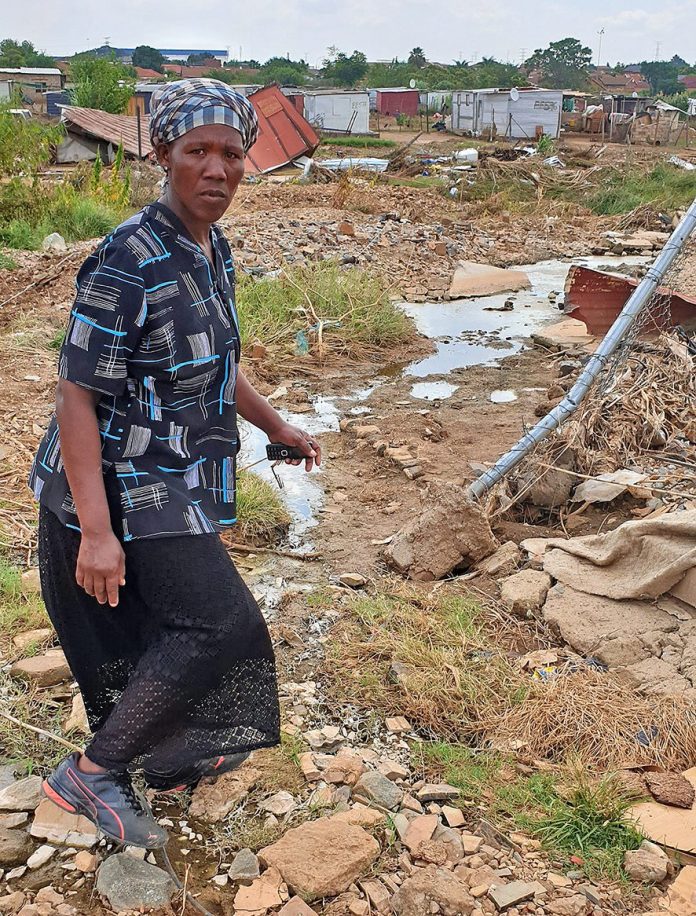Walking through the streets of the informal settlement called 77, on the banks of the Moretele River in Mamelodi, north-east of Pretoria is a protracted battle between illegal electricity connections and sheer despair.
Linda Monnaemang, who sells vetkoeks at Eerste Fabriek train station, starts at 3am to make vetkoeks to sell from 4am. The 41-year-old single mother of three returns to the station at 4 pm to sell snacks, sweets, and cigarettes.
She is one of the families that are accommodated at the Mamelodi West community hall after floods on February 5 destroyed their homes, swept away their furniture, appliances, and other possessions – for the second time in as many years.
Her four-year-old son, Tebogo, who is in the care of her 31-year-old brother, Keaoleboga, is at the shelter. It gives her peace of mind to know that they are safe, but to support her family she is back at her shack.
When disaster struck, she recounts that Keaoleboga and Tebogo were in the shack situated near the bridge, the main path for the water. “Had it not been for one of my neighbours who knew that my family was in the shack and risked his life to save them, I don’t know what would have happened,” said Monnaemang, who was not yet home on that day.
“I know it is not safe to be here [in her shack] but the station is a walking distance from here.”
She added that since the accommodation at the hall is only temporary, “if we don’t have a place to stay; we still have to come back here anyway”.
She does not live far from Jane Mmamatshele. She is at the shelter with her daughter Kgopotso. The shelter is just a few minutes’ walk from her school – and unlike some of the children, she has not missed a single day of school since the floods.
“When I think about that night, I want to cry,” she said, “I had just taken a bath, so when I saw a pool of water on the floor, I thought it was from the bucket I used earlier.”
After mopping the floor, she joined Kgopotso in bed who was already asleep. It was not long before she was also lulled into a deep sleep by the rain.
It was a loud banging at her door at about 1am that woke Mmamatshele. When she climbed off her bed, the water was almost up to her waist. More water gushed into her shack when she opened her door. “It was not raining heavily that day,” she said, “that’s why the floods caught most of us unawares.
“My daughter is still startled by the sound of water. She shudders even when you tap her shoulders. To wake her up for school in the morning, I have to be cautious not to frighten her.”
Half of her shack was destroyed in the floods. Her ID and her daughter’s birth certificate are also gone.
She has started rebuilding her shack to safeguard the little she could recover. She said she has no wish to return to the “dangerous place”, but fears she will be back again just like in 2019 when promises to relocate them to a safer area did not
materialize.
Dorcas Makgoga sits with two of her grandchildren at the center. The floods have added to her many stresses, from ill-health to not having a cent to her name after her job of nine years working on a farm in Groblersdal ended last September and not being able to access the Unemployment Insurance Fund.
The 52-year-old from Limpopo is waiting for her daughter to return from Limpopo to restore their home at the informal settlement.
Some residents are already back in their homes after rebuilding their shacks.
Others were not even affected by the floods with stoeps shining blindly under the sun this week.
Some informal houses around the area didn’t even know that a state of disaster was unfolding just beyond the walls that separate these two areas.
Follow @SundayWorldZA on Twitter and @sundayworldza on Instagram, or like our Facebook Page, Sunday World, by clicking here for the latest breaking news in South Africa. To Subscribe to Sunday World, click here.



